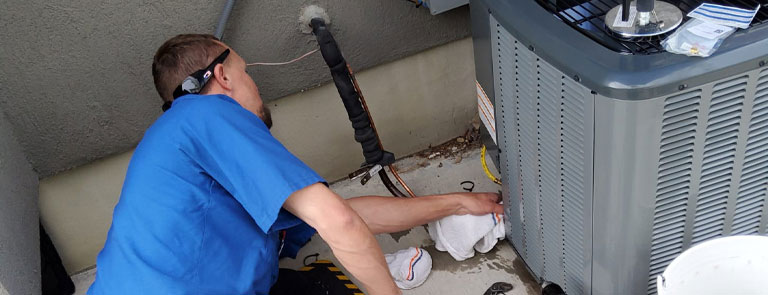When it comes to maintaining a comfortable and healthy living environment, a reliable HVAC system plays an important role. However, like any other mechanical equipment, HVAC systems have a limited lifespan. Understanding the average lifespan of an HVAC system can help homeowners make informed decisions about repairs, replacements, and routine maintenance. Let’s explore the factors that affect the longevity of HVAC systems and their lifespans below.
Importance of HVAC System Longevity
HVAC systems are a big investment for homeowners, and understanding how long they can last is important for budgeting and planning. The lifespan of an HVAC system depends on several factors, including the quality of installation, regular maintenance, system type, usage patterns, and environmental conditions. By taking proactive measures to extend the lifespan of your HVAC system, you can avoid costly breakdowns, minimize energy consumption, and ensure a cool home for years to come.
Factors Affecting HVAC System Lifespan
- Quality of Installation: Proper installation by an experienced professional like 1st American Plumbing, Heating & Air is the first step to ensuring your HVAC will live a long life. Poor installation can lead to inefficient operation, premature wear and tear, and your system won’t last as long as it should.
- Regular Maintenance: Regular maintenance is essential to keep your HVAC system operating efficiently and lasting a long time. Routine inspections, cleaning, and servicing can prevent minor issues from escalating into major problems, improving overall performance and longevity.
- System Type: Different HVAC systems have varying lifespans. Furnaces typically last around 15 to 20 years, air conditioners can last 10 to 15 years, heat pumps have an average lifespan of 10 to 15 years, and ductless mini-split systems can last up to 20 years or more.
- Usage Patterns: The amount of time your HVAC system is running directly impacts its lifespan. Systems that are constantly working hard or subjected to heavy usage can wear out more quickly than those used occasionally or in moderate climates.
- Environmental Conditions: The environmental conditions outside of your home also influence your HVAC system’s lifespan. Extreme temperatures, high humidity, poor air quality, and exposure to corrosive substances can speed up wear and tear, shortening the longevity of your system.
Average Lifespan of HVAC Systems
According to industry experts and various studies, the average lifespans of different HVAC systems are as follows:
Furnaces: On average, a well-maintained furnace can last between 15 to 20 years. Regular inspections, filter replacements, and repairing minor issues quickly can help extend its lifespan.
Air Conditioners: Air conditioners last approximately 10 to 15 years. Routine maintenance such as cleaning or replacing filters, regular coil cleaning, and refrigerant level checks, can contribute to its longevity.
Heat Pumps: With regular maintenance, heat pumps can typically last between 10 to 15 years. Regular inspections, cleaning the coils, and ensuring proper airflow can help maximize a heat pump’s lifespan.
Ductless Mini-Split Systems: These systems are known for their longevity, lasting on average 20 years or more when well-maintained. Regular filter cleaning or replacement, keeping proper refrigerant levels, and professional maintenance can enhance their performance and durability.
It’s important to note that these average lifespans are based on well-maintained systems. If you neglect regular maintenance, it can significantly reduce the lifespan of your HVAC system. Follow manufacturer recommendations and schedule professional maintenance to maximize the longevity of your system.
Maximizing HVAC System Lifespan
If you own your home, you can take specific steps to maximize the lifespan of your HVAC system. Even if you haven’t been attentive to your HVAC until now, it’s important that you start following these recommendations starting now:
- Regular Maintenance: Schedule annual or bi-annual maintenance inspections with a professional HVAC technician to ensure the system is running optimally and to address any emerging issues promptly.
- Air Filter Maintenance: Regularly clean or replace air filters to maintain proper airflow and prevent debris buildup, reducing strain on the system
- Regular Maintenance: Schedule annual or bi-annual maintenance inspections with a professional HVAC technician to ensure the system is running optimally and to address any emerging issues promptly.
- Air Filter Maintenance: Regularly clean or replace air filters to maintain proper airflow and prevent debris buildup, reducing strain on the system.
- Proper Usage: Avoid excessive usage or running the system when it is not necessary. Programmable thermostats can help optimize energy consumption and reduce wear and tear on the system.
- Addressing Issues Promptly: If you notice any unusual noises, reduced airflow, or inconsistent temperature control, it is crucial to have the system inspected and repaired promptly to prevent further damage.
Understanding the lifespan of your HVAC system is essential for maintaining a comfortable and energy-efficient home. By considering factors such as installation quality, regular maintenance, system type, usage patterns, and environmental conditions, you can make informed decisions about your HVAC system. Whether you need professional installation, routine maintenance, or expert advice on maximizing the lifespan of your HVAC system, 1st American Plumbing, Heating & Air is here to help. Contact us today to schedule an appointment with our experienced technicians and ensure your HVAC system operates efficiently for years to come. Don’t wait until it’s too late – invest in the longevity of your HVAC system now and enjoy a comfortable home environment all year round.
[/av_textblock]


